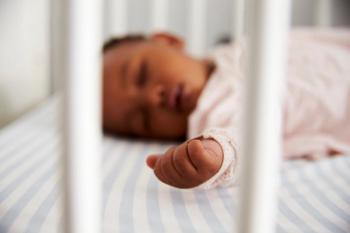
Procalcitonin predicts bacterial coinfection in acute bronchiolitis
An elevated level of serum procalcitonin (PCT) in an infant with acute bronchiolitis should raise a clinician’s suspicions that the child may have a bacterial coinfection, a new study indicates.
An elevated level of serum procalcitonin (PCT) in an infant with acute bronchiolitis should raise a clinician’s suspicions that the child may have a bacterial coinfection, a new study indicates.
Investigators analyzed the records of 40 infants admitted to the pediatric intensive care unit for acute bronchiolitis. Chest radiographs (CXRs), various cultures, and procalcitonin and white blood count (WBC) measurements were performed for all patients, aged 0 to 9 months. Bacterial coinfection was diagnosed in 15 (38%) of the 40 study patients based on positive CXR (6/15), urine culture (2/15), or tracheal aspirate culture (8/15).
A comparison of the mean values of PCT and WBC measurements for those with positive bacterial cultures and infants without evidence of bacterial coinfection showed that PCT is a far more reliable marker than WBC for bacterial coinfection because of its substantially higher sensitivity and specificity.
Whereas a cutoff value of 1.5 ng/mL of procalcitonin had a sensitivity of 0.80 and a specificity of 1.00 for bacterial coinfection, WBC’s significance was minor, with a sensitivity of 0.33 and a specificity of 0.96 (
Commentary: These patients may be quite different from the babies who are generally admitted with bronchiolitis to an inpatient pediatric unit near you. In this study, all the babies were admitted to an intensive care unit and their rate of secondary bacterial infections was higher than that of children with bronchiolitis in most previous reports. Even in less ill babies with bronchiolitis, however, testing for serious bacterial infection (SBI) is common. In a recent retrospective 2-center study, Librizzi and colleagues found that 46% of 1,233 children aged younger than 2 years admitted with bronchiolitis underwent some sort of testing for SBI. Young age and fever were associated with higher rates of testing. Testing was linked to increased likelihood of antibiotic therapy and longer length of stay-all this despite multiple studies showing bacterial illness to be uncommon in association with bronchiolitis (
Ms Freedman is a freelance medical editor and writer in New Jersey. Dr Burke, section editor for Journal Club, is chairman of the Department of Pediatrics at Saint Agnes Hospital, Baltimore, Maryland. He is a physician contributing editor for Contemporary Pediatrics. The editors have nothing to disclose in regard to affiliations with or financial interests in any organizations that may have an interest in any part of this article.
Newsletter
Access practical, evidence-based guidance to support better care for our youngest patients. Join our email list for the latest clinical updates.








